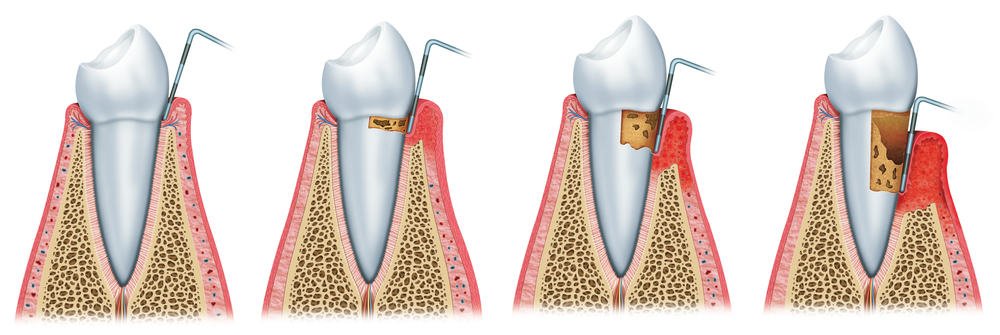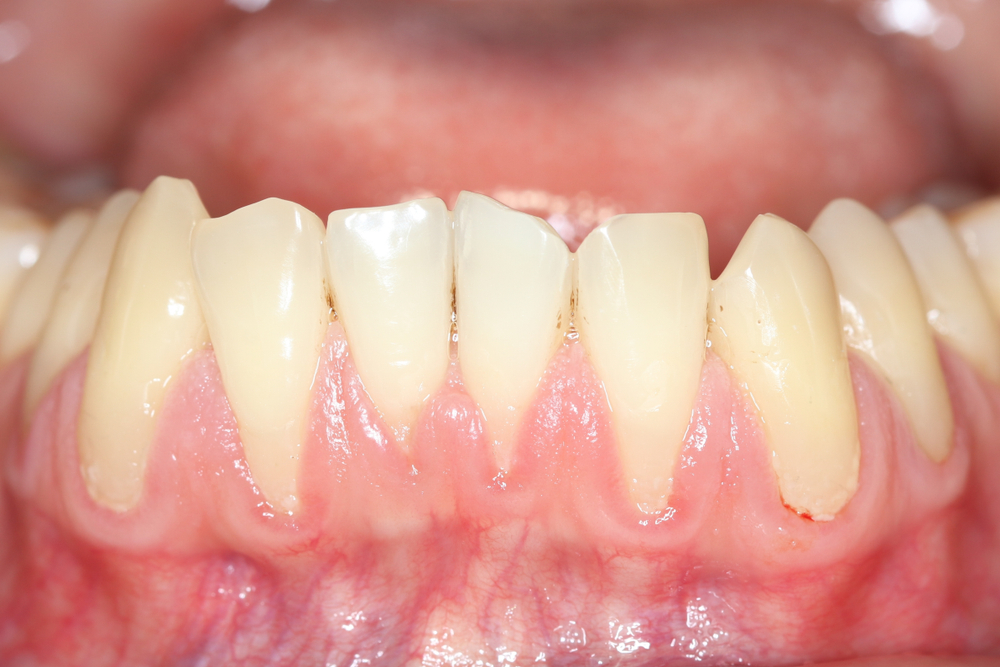
Gum recession occurs when the gum tissue that envelops the teeth deteriorates or is otherwise pulled back. When this happens, your teeth are dangerously exposed. Gum recession can get to a level where even the roots of your teeth are exposed. The process of gum recession begins when gaps between the gum and teeth are developed, allowing bacteria to build up and cause dental diseases. Because the process of gum recession is slow and gradual, many sufferers of this common condition are unaware that their gums are receding. However, if left unchecked the surrounding tissues and bone structures that make up the teeth and gum will be significantly damaged. With enough damage, your teeth will start to fall out. It is best to stop the process of gum recession as early as possible. At Pickett Family Dental, Dr. Tyson Pickett, DDS FAGD and the hygienists are well-experienced in treating gum recession at all stages. If you notice any of these symptoms you might be at risk for gum recession:
- Tooth sensitivity
- Certain teeth look longer than before
- A rough spot or notch can be felt at the gum line
- Pain at the gum line
- Red, swollen gums that frequently bleed when brushing or flossing
Gum recession should not be ignored. Call us at (817) 431-5514 to schedule an appointment to keep your gums healthy and your smile beautiful.
What do Receding Gums Look Like?
The way to identify receding gums is by looking at the gum tissue surrounding each individual tooth. If the height of the gum tissue varies or if you see that the gum tissue surrounding the teeth draws back and seems red or worn away, then you are looking at receding gums. Gum recession is quite common and easy to identify because of these key characteristics:
- Longer Teeth
- Tooth Sensitivity
- Notch at the Gum Line

What Causes Receding Gums?
There are many reasons why gums recede – the most notable cause being gum disease. Below are some other causes that might start the process of gum recession:
- Periodontal (gum) diseases
- Your genes
- Old age
- Aggressive tooth brushing
- Insufficient dental care
- Hormonal changes
- Medical conditions like Diabetes
- Tobacco products
- Grinding and clenching your teeth
- Crooked teeth or a misaligned bite
- Body piercing of the lip or tongue
Why Are My Gums Receding?
The most common causes of receding gums are due to ageing, brushing teeth too hard, or poor oral health that includes plaque and tartar buildup. Depending upon the state of your oral health, you are very likely to be suffering from gingivities, which occurs due to the inflamed gum tissue with the presence of plaque bacteria that hardens into tartar.
The gum tissue separates from plaque developing inbetween the gum tissue and the tooth. As it hardens, the gum deteriorates and ‘recedes’ down to where it can properly connect to the tooth.
How Is Gum Recession Treated?
Typically, minor gum recession is treated by a dentist or dental hygienist performing a deep cleaning (tooth scaling and root planing) in order to remove the plaque (tartar) that builds up on the teeth and gum. Our dental hygienists use an ultrasonic instrument or manual scaling tools to remove the plaque on the surface of the enamel under the gums that cause chronic irritation and bone loss. This procedure is different from regular cleaning which only cleans along the gum line. Deep cleaning also targets the roots of your teeth to make the cementum on the surface smoother. This will help keep plaque from forming in spaces that are uneven. Finally, antibiotics may be prescribed in order to clear out the remaining harmful bacteria. In instances where gum recession has been left untreated for an extended period of time, dental surgery may be required. This is a last resort used when there is excess loss of bone or when the gaps between the teeth and gum are too deep to be treated by deep cleaning.
How to Fix Receding Gums?
Gum recession treatment varies depending upon the patient and the condition of the gums and the surrounding tissue. Mild to moderate cases can be improved with a dental cleaning, antibiotics, or even dental bonding. However, in more severe cases, gum recession surgery is needed.
How to Fix Receding Gums at Home?
There aren’t many cases where you can fix receding gums at home. You should visit the dentist immediately if you notice that you have gum recession for a complete diagnosis to understand the root cause of your receding gums.
For those that are suffering from receding gums, understand that sometimes a dental cleaning and better oral healthcare is all that’s needed to fix the situation.
However, for others, there may be more important steps needed to ensure that you keep your teeth and repair your smile. We urge you to contact Dr. Tyson Pickett, DDS FAGD and his team in Keller, to safeguard your smile prevent more costly damage.
What Surgeries Treat Gum Recession?
Depending on your situation, your dentist may recommend any of the following surgeries to repair the damage caused by gum recession:
- Open flap scaling and root planing
- Regeneration
- Soft tissue graft
What Can I Do to Help Prevent Gum Recession?
The most effective way to prevent the process of gum recession from ever occurring is by practicing good oral hygiene techniques. Make sure you are brushing your teeth daily with a soft-bristled toothbrush and a dentist-recommended toothpaste that includes fluoride. See your dentist or periodontist at least twice a year or more depending on whether or not you have a dental condition such as gum recession. If the cause of your gum recession is teeth grinding, look into buying a protective custom dental mouth guard. Below are some other general tips to help prevent gum recession:
- Don’t smoke tobacco.
- Eat a healthy and balanced diet.
- Note and track any differences occurring in your mouth to tell your dentist.
By practicing the tips above, you have a much higher chance of having a perfect, healthy smile forever. If you need assistance in dealing with any stage of gum recession, don’t hesitate to call us at (817) 431-5514 or schedule an appointment now for treatment or advice before it gets worse!



